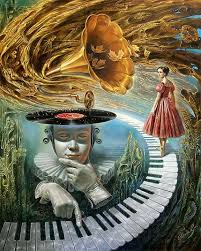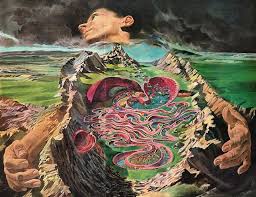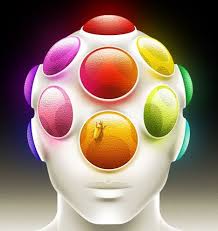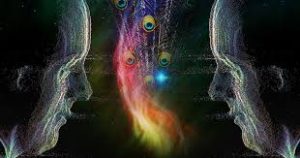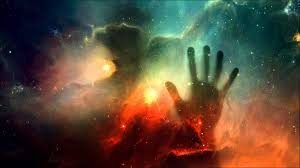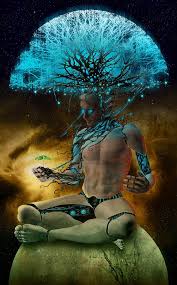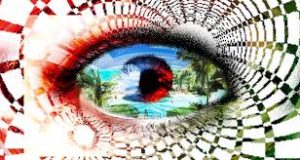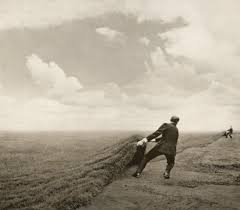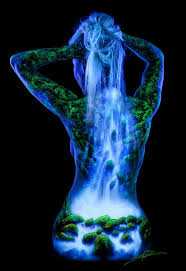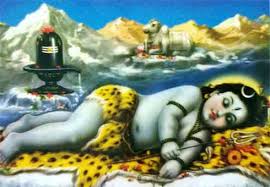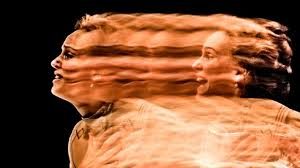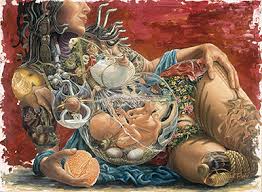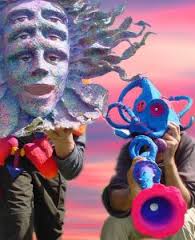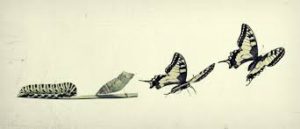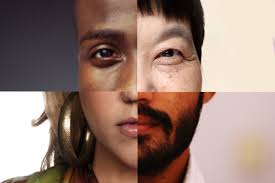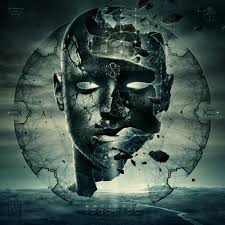For all practical purposes, of course, we will usually find ourselves in some sort of body form in our out-of-body experiences. There are a necessary camouflage, for we cannot yet think of identity without some kind of body, so we project in such a form. It varies according to our abilities, and without it, we would feel lost indeed. The form itself is not important, but it can tell us something about the dimension in which we are having the experience.

The dream body is the one with which we are most familiar. It has been called the astral body. It strikes us as being physical when we are in it, but we can do things with it that can’t be done ordinarily. We can levitate, for example. As a rule, however, we do not go through walls with this body. This is the body we use for ordinary dreams. Levitation is possible with it but on a limited basis.

When we enter a different dimension, the abilities of the body form change, and for all intents and purposes, it is a different body form — which we will now call a mind form. It still seems physical in shape, but we can walk through physical matter with it. We can levitate much more freely, traveling within the solar system. But we cannot go further with it.

In the first form, it is possible to perceive the past, present or future on a limited basis. In the second form, this perception is increased, the scope of consciousness widened. This is the form we will use if we meet by appointment with others in the dream state.

The third we may call the true projection form. In it, it is possible to travel beyond our solar system, and to perceive the past,present and futures of other solar systems as well as our own. The various forms that we use do not dictate our experience, however. We may begin in one form and change to another — or go from the first to the third. On such occasions we must pass through in reverse direction [on returning]. The forms merely represent stages of consciousness.

At physical death, after the last reincarnation, then the normal form is the dream body, and excursions are made from this point. It is possible, as mentioned, to suddenly switch from the third form to the dream body, but with a considerable jolt to consciousness.

There are, indeed, others who can help us in such experiences, and they can be of great assistance as guides. We will find projections much easier if our head is to the north.

Now, when we project from the dream body, consciously we are already outside of the physical one. We have already made the initial change away from physical focus. The mass of valid projections are made from the dreaming body. When the excursion is over, the return to the dream body is made with no strain, for the ego is little concerned. In many such cases, however, the knowledge is not available to the waking self.

As we become more accustomed to the experience, the waking self will recall more and more and not become frightened. When we panic, from the waking condition, the experience ends. If the waking self had not been taken along in this particular manner, the journey could have continued.

Very rarely do we go wide-awake, speeding out of our body like a rocket. Dream projections are quite different, in any case, and the ego is already protected.

I want to give some idea of the conditions we may expect to meet in any successful projections, so that you will be prepared to some extent. For simplicity’s sake, we will call the body forms discussed, forms one, two and three.

Form one will spring out of an ordinary dream state. In spontaneous projections, you may become conscious in form one, project, return to the ordinary dream state and from there project again several times. You can expect these particular projections to be difficult to interpret now, though you may find the experience intact in the middle of any given dream record.

Our excursions with form one will be within our own system, largely connected to the earth, although past, present and future may be involved. We may, for example, visit New York in the year 2030.

The projections here are fairly short in duration, though exceptionally clear. You may encounter phantoms from your own subconscious, however, and they will seem exceedingly real. If you realize that you are projecting, you may simply order any unpleasant phantoms to disappear, and they will do so. You may banish a nightmare also, if you realize that it is a product of your own subconscious. If you treat it as a reality, however, then you must deal with it as such until you realize its origin or return to the ordinary dream state.

In form two you will not, as a rule, encounter any subconscious phantoms. Ordinary dream elements will not be as frequent, nor will they intrude as much. A longer duration of projection is possible. The vividness is extraordinary. Here you will begin to perceive quite clearly constructions that are not your own, where earlier these are but dimly glimpsed. A certain period of orientation will be necessary, simply because these other constructions may seem bewildering. Some will exist in you future. Some may have existed in your past, and some were thought of, but never materialized.

But the reality of all of these constructions will be equally vivid, you see, for they are, indeed, equally real. I will give you a simple example. You may find yourself in a room with certain people. Later, upon awakening, you realize that both the people and setting belong to a particular sequence in a novel. You think then: ‘This was no projection, then, but only a dream.’

It may, however, be a valid projection. The room and people exist but not in a way you endorse as reality. They exist in another dimension, but as a rule you cannot perceive it. Paintings that you will paint. It is possible for you to project yourself into one of your own future landscapes. This would not be an imaginative projection. This is what I am trying to tell you.

You may find yourself, for example, in the middle of a battle that was once planned in some general’s mind, a battle that never materialized in physical reality. In such a case, incidentally, you were not a part of the battle and could not be harmed. However, you might be attracted enough to project yourself spontaneously into the body of one of the soldiers, in which case you could experience pain until your own fear pulled you back. As you learn control, such mistakes vanish.

There are various situations you must learn to handle, attractions and repulsions which could pull you willy-nilly in any direction. Experience will teach you how to handle these. What is needed is a steady maintenance of identity under conditions which will be new as far as your conscious awareness is concerned. I cannot emphasize too strongly that projections into other dimensions do occur. Many such instances are often considered chaotic dreams because there is no way to check the against physical events since they did not occur in physical terms.

It is possible for you to project to a future event in which you will be involved and by an act that you make in the projection, alter the course that this future will take. Such an action would therefore appear to happen twice, once in your present and once in your future. But in the future, you would be the one whose course is altered from this traveling self from the past.
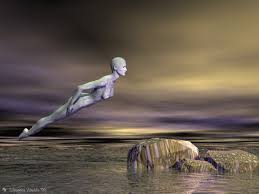
Let us take an example: While asleep, you project into 2030. There you see yourself considering various courses of action. For a moment you are aware of a sense of duality as you view this older self. You communicate with this other self; and we will go into this sort of thing more deeply in another blog. In any case, your future self heeds what you say. Now in the actual future you are the self who hears the voice of a past self, perhaps in a dream, of perhaps in a projection into the past.

Remember I listed briefly the three forms used during projections. In the first form, we usually use certain inner senses. In the second form, we use more of these, and in the third form, we attempt to use all of them, though very rarely is this successful. We should notice the overall form of perception that we seem to be using. We automatically shield ourselves from stimuli that are too strong for our own rate of development. This kind of balancing can lead to an unevenness of experience, however, in any given projection.

As we know, it is almost impossible for us to be aware of the full perception possible, for the ego would not stand for it. Often, even in simple dreams, however, we will feel concepts or understand a particular piece of information without a word being spoken. In some projections, we will also experience a concept, and, at first, we may not understand what is happening. In these, we experience as actual the innermost reality of a given concept.

In a dream recorded before this blog, I was in the third form, and I did not project beyond our solar system. This was still a projection within the physical universe, however. I was given information that I did not remember. When we explore the inside of a concept, we act it out. We form a temporary but very vivid image production. If my experience had been only this, it still would have been pertinent, for when we understand a concept in such a way the knowledge is never forgotten. It becomes part of our physical cells and our electromagnetic structure.

I want to be clearer, however. Suppose that we suddenly understand the concept of oneness with the universe, and that this inner sensing of concepts is to be used. We would then construct dream images, a multitudinous variety of shapes and forms meant to represent the complicated forms of life. We would then have the experience of entering each of those lives. We would not think of what it was like to be a bird. We would momentarily be one. This does involve a projection of sorts, yet still must be called by contrast a pseudo-projection. A normal projection would involve one of the three body forms.

Some experiences, then, will be simple attempts to use the inner senses more fully. They may appear to be projections, and as we go along, I will tell how to distinguish between them.

We will be able to look back and see our physical body upon the bed on some occasions, and in other cases we will not be able to do this. In the first body form, for example, we can look back and see the physical body. If we project from this form into the next, in order to intensify the experience, then from this second form we will not see the physical one. We will be aware of it, and we may experience some duality. In the third form, we will no longer be aware of the physical body, and we will not see it.

In the third form, our experience will be most vivid. They may involve us in other systems beside our own, and we will have little contact with the physical environment. For this reason, projections in the third form are the most difficult to maintain. There are dangers that do not exist when the other two forms are used.
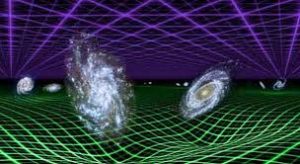
Using the third form, there could be a tendency for us not to recognize our own physical situation. It would be difficult to carry the memories of the present ego personality with us. This third form is the vehicle of the inner self. The disorientation that it feels is the same that it will feel when the physical body is deserted at the point of death. This disorientation if only temporary, and when at death the form is severed from the physical body, then all the memories and identity within the electromagnetic structure become part of the inner self. This form is sometimes used for purposes of instruction, however, or to acquaint the whole personality with the circumstances that strongly affect it.

Most of our projection will be in the first and second form, in any case. Usually we will project from the physical body into the first form and then, perhaps, into the second.
Occasionally, this will happen and we will not know it, despite all our attempts to ascertain our circumstances.

There are ways of knowing when we switch forms, of course, and we shall see that information in future blogs. You should have several projections within the first and second forms in the following months if your development continues.

I want to mention in future blogs, the difference in experience and sensation between projections from a dream state and those from the trance state and also what is called awake-seeming dreams, for there are many things here that you do not know, and they are fairly important.

A curious new second life began, adjacent to our normal one. Some may call it a fantasy life, but surely it is no more fantastic or mysterious than the ordinary world in which we all find ourselves.
